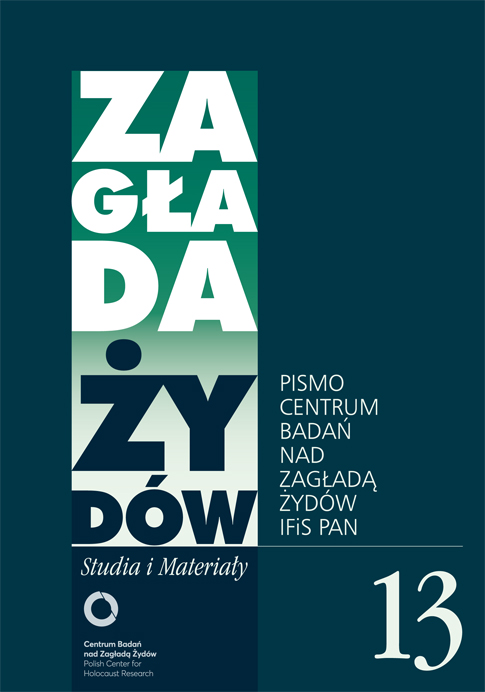Bernard Mark, powstanie w getcie warszawskim i proces Jürgena Stroopa
Zagłada Żydów. Studia i Materiały, Nr 13 (2017), Strony: 181-202
Data zgłoszenia: 2020-10-17Data publikacji: 2017-12-03
 https://doi.org/10.32927/ZZSiM.356
https://doi.org/10.32927/ZZSiM.356
Abstrakt
Jürgen Stroop, the SS general who led the liquidation of the Warsaw Ghetto and the suppression of the Warsaw Ghetto Uprising in April–May 1943, was convicted by a Polish court in 1951 and executed in 1952. Bernard (Ber) Mark (1908–1966), Holocaust historian and director of the Jewish Historical Institute in Warsaw, provided expert testimony for the prosecution at Stroop’s trial. Mark felt constrained to graft a communist-inflected narrative onto his account of the Warsaw Ghetto Uprising and to shoehorn it into his expert testimony in court and then into his interpretation of the trial for a Jewish audience. He did his best to give the Jewish Fighting Organization, which spearheaded the uprising, and its Jewish fighters their due at a time when expression of unvarnished appreciation for Jewish heroism was risky, even while he was paying overrated tribute to the communist underground for its assistance to the Jewish rebels during the uprising. But he always stopped short of the line between conformity to and defiance of the communist regime
Słowa kluczowe
Bernard Mark , Żydowski Instytut Historyczny , powstanie w getcie warszawskim , proces Jürgena Stroopa
Licencja
Prawa autorskie (c) 2017 Autor&"Zagłada Żydów. Studia i Materiały"

Utwór dostępny jest na licencji Creative Commons Uznanie autorstwa 4.0 Międzynarodowe.
https://creativecommons.org/licenses/by/4.0
Czasopismo publikowane jest w standardzie Diamond Open Access na licencji CC-BY-4.0 Deed - Uznanie autorstwa 4.0 Międzynarodowa - Creative Commons
Inne teksty tego samego autora
- Gabriel Finder, Proces Szepsla Rotholca a polityka kary w następstwie Zagłady , Zagłada Żydów. Studia i Materiały: Nr 2 (2006)
- Gabriel Finder, Svenja Bethke, Dance on the Razor’s Edge:Crime and Punishment in the Nazi Ghettos [Gabriel N. Finder] , Zagłada Żydów. Studia i Materiały: Nr 17 (2021)
Podobne artykuły
- Alina Skibinska, Joanna Tokarska-Bakir, „Barabasz” i Żydzi. Z historii oddziału AK „Wybranieccy” , Zagłada Żydów. Studia i Materiały: Nr 7 (2011)
- Jacek Leociak, Ruta Sakowska (1922–2011) , Zagłada Żydów. Studia i Materiały: Nr 7 (2011)
- Adam Puławski, Zagłada Żydów na polskich terenach wcielonych do Rzeszy, red. Aleksandra Namysło, Instytut Pamięci Narodowej, Warszawa 2008 , Zagłada Żydów. Studia i Materiały: Nr 6 (2010)
- Andrzej Żbikowski, Marcin Urynowicz, Adam Czerniaków 1880–1942. Prezes getta warszawskiego, Instytut Pamięci Narodowej, Warszawa 2009 , Zagłada Żydów. Studia i Materiały: Nr 6 (2010)
- Ewa Cuber-Strutyńska, Witold Pilecki. Confronting the legend of the “volunteer to Auschwitz” , Zagłada Żydów. Studia i Materiały: Nr Holocaust Studies and Materials (2017)
- Elżbieta Janicka, Instead of negationism. The symbolic topography of the former Warsaw ghetto vis-à-vis Holocaust narratives , Zagłada Żydów. Studia i Materiały: Nr Holocaust Studies and Materials (2017)
- Agnieszka Haska, „Choć klimat jest dobry…” Polscy Żydzi internowani na Jamajce w latach 1942–1945 , Zagłada Żydów. Studia i Materiały: Nr 17 (2021)
- Ewa Wiatr, Kawalerowie Krzyża Żelaznego w getcie łódzkim , Zagłada Żydów. Studia i Materiały: Nr 8 (2012)
- Agnieszka Witkowska-Krych, Pamiętnik Janusza Korczaka oraz wojenne źródła pochodzące z Domu Sierot. Jak przetrwały? , Zagłada Żydów. Studia i Materiały: Nr 8 (2012)
- Barbara Engelking, Jan Górnicki (Ber Oszer Weisbaum), Notatki , Zagłada Żydów. Studia i Materiały: Nr 8 (2012)
<< < 5 6 7 8 9 10 11 12 13 14 15 16 17 18 19 20 21 22 23 24 25 26 27 28 29 30 31 32 33 34 35 36 37 38 39 40 41 42 43 44 45 46 47 48 49 50 > >>
Możesz również Rozpocznij zaawansowane wyszukiwanie podobieństw dla tego artykułu.
 English
English
 Język Polski
Język Polski



 https://orcid.org/0000-0003-2829-3979
https://orcid.org/0000-0003-2829-3979





